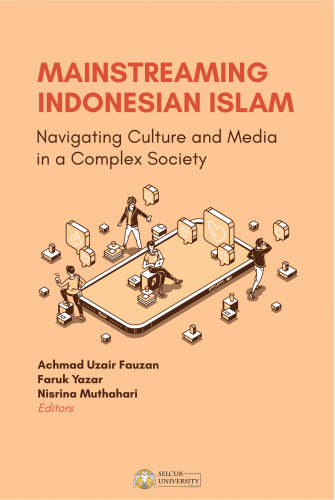
MAINSTREAMING INDONESIAN ISLAM: Navigating Culture and Media in a Complex Society
İndir
Özet
The book Mainstreaming Indonesian Islam: Navigating Culture and Media in a Complex Society explores the multifaceted nature of Indonesian society, emphasizing the interplay between local culture, Islamic values, and modernity. The chapters highlight Indonesia's cultural diversity and the transformative role of media as a platform for unity, identity, and social change. A recurring theme is the necessity of media literacy to counter misinformation, foster critical engagement, and promote responsible reporting. This is especially evident in essays by Bono Setyo and Lelita Azaria Rahmadiva, which address media’s influence on radicalism and the COVID-19 infodemic.
The book also examines social challenges of the digital age, such as social media addiction and its impact on relationships, discussed by Suzanna Alivia Putri et al. They emphasize the need for balanced digital usage to preserve social and emotional well-being. Other chapters, such as those by Fitriani Jamaluddin et al., focus on communal intellectual property, stressing the importance of legal frameworks and grassroots education to protect cultural assets and promote equitable economic growth.
Environmental issues and policy integration are explored by Hastangka et al., who advocate incorporating ecological values into Islamic education to raise environmental awareness. Fajrul Ilmy Darussalam discusses the critical need for medical waste management in post-pandemic Indonesia, highlighting the role of infrastructure and public collaboration.
The dynamics of millennial voters, analyzed by Wahyu Kuncoro, reveal a shift toward pragmatic and rational decision-making influenced by education and digital engagement. The challenges faced by Indonesian migrant workers, addressed by Qorir Yunia Sari, underline the need for comprehensive protections and welfare improvements.
Cultural phenomena such as religious education and K-pop celebrity worship are explored by Rina Sari Kusuma, illustrating the intersection of global pop culture with local religious norms. Meanwhile, Ryan Achmad Basir’s study of the Ba’alawi diaspora showcases their contributions to Islam’s development and Indonesia-Yemen relations. Religious tourism across ASEAN countries, discussed by Muryanti et al., highlights its economic and cultural potential, while Erwan Baharudin et al. recontextualize the kris as a cultural and spiritual symbol within santri communities.
In sum, this collection provides deep insights into Indonesia’s ability to harmonize its cultural and religious heritage with modernity, presenting a model for inclusive and sustainable societal development amidst globalization.

